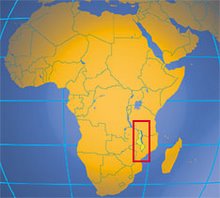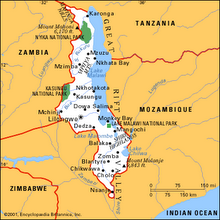I’m sunburnt, my hands are blistered, my stomach is upset and my muscles ache… but my Chichewa is better, my eyes have been widened and I have a much better appreciation for the challenges and hard work that are the daily activities of village life. I have recently spent five days in Chilimani village, one of the communities serviced by the Namikomia gravity fed water system which we are working to rehabilitate. Although only about 20 kilometres from my home in Machinga, it seems a world apart. I planned this village stay wanting to learn about the project from the beneficiaries point of view – what are the major problems with the system; where do people go to collect water when the tap is broken, water is not flowing or the pressure is too low; what does it feel like to have to collect water every day for your household uses; what other activities are important to the household and how does water collection fit amongst these other priorities – answers to all of these questions plus hoping to improve my Chichewa language skills and gain an appreciation for village life were the driving forces behind this visit.
I stayed with the Wadi family, the elder brother of the village chief, and his family. With 8 children, the youngest Omali, 14, still lived at home. The fourth born, Estere, 28, and her 3 children, Amina, 11, Malugula, 6, and Twaina, 4, has moved home to stay with her parents after the recent death of her husband in August of this year. I stay in a grass thatched house with the women and the two youngest children. We sleep on reed mats on the dirt floor and try to avoid the drips of rain coming through the roof. The day begins at 4:30AM when I set off with Estere and Mrs. Wadi into the fields to get some work done before the sun rises too high in the sky. We work with hoes to make ridges in the dirt, raising the planting soil and making channels for flowing rain water. The women chatter, the kids run around, Mrs. Wadi points this way and that, aiming me towards places to work and every so often scolding me good-heartedly in Chichewa because I’ve damaged a new maize stalk just budding. Everyone watches me carefully with a mix of intrigue and disbelief. Some think it’s funny, others are impressed to see me working and appreciative of my efforts, however bad they may be. There is always an inspection of my blistered hands at the end of 2 to 3 hours in the fields. We then head back to the house to collect buckets and head the approximately 200 m to the village tap. Luckily, being a relation of the chief, the tap is not located too far away. We wait at the tap with the other women and children and once my bucket (the smallest of them all) is filled, a woman helps me hoist it on my head and I start back to the house. Carrying about 15L of water on your head is tough and heavy! It hurts your neck, it’s hard to balance as the water sloshes around above, dripping over the edge and down your face, and making your hands slippery and hard to grip. I waddle, dodging low hanging branches, with water dripping down my face, not nearly as elegantly as the women around me who flow down the path carrying larger buckets balancing on their heads and babies on their backs.

Mrs. Wadi and Omali working in the fields as the sun rises behind
After bathing and breakfast, most of the rest of the day is spent in the shade, visiting with the steady stream of visitors, preparing food for the next meal, munching on mangoes, and pounding maize (painful on my already blistered hands). I try to assist with food preparation but am ushered out of the kitchen enclosure on multiple occasions because the smoke from the fire is making my eyes water. When sitting with visitors, I have my face in my Chichewa book trying to find the words to ask the questions I’m forming in my mind. Although my Chichewa definitely got better out of necessity – no one in the Wadi family speaks English and very few people in the village in general – my inability to communicate well inhibited how much I could learn about the project questions I had. I did manage to find out some things but not as much as I would have through an interpreter. I did, however, manage some information gathering through a mix of broken Chichewa, English and charades.

Estere in the kitchen with Malugula & Twaina looking on

Trying my hand at pounding maize
One afternoon, after the real heat of the day had passed, Mrs. Wadi, Estere and her friends Patuma and Bedina and I set off on a walk to go and see the nearby Shire River. Along the way we stop at the borehole in the next village so I can test out my first handpump in Malawi. The gravity systems in Malawi are largely the legacy of Malawi’s first president. Boreholes, however, were the flavour of the day for the second president. As a result, in the same area serviced by a gravity fed system, you also find a smattering of boreholes, often in very close proximity. The problem that arises is that when a tap breaks down or the gravity system requires repairs and an alternative water source in the form borehole is available, the urgency to repair the system is lost and many downstream users who may not have as reliable alternate sources, are negatively impacted.

Pumping water from a borehole
The second stop on our walk is to visit Agnes Wilson. Somewhat of a legend in the area, Agnes is the survivor of a crocodile attack in 1999. At that time, before the start of the system rehabilitation, the gravity fed system was no longer functioning and Agnes went daily to the Shire River to collect her household’s water. One day, while drawing her water bucket from the river, a crocodile emerged out of the depths and grabbed her right wrist. Although, she managed to escape and has since recovered remarkable use of her hand, the incident still seems very fresh. The tap in her community is now flowing thanks to the rehabilitation work but still lacks a proper tap, funds for which have yet to be collected from the tap users.

Agnes Wilson
As we pick our way down to the river and then back home, we stop periodically along the way to visit with community members, interested in the strange visitor amongst them. I am repeatedly presented with gifts of fresh fruits or eggs and am struck by the kindness and generosity of the people, especially given how little they have. I can’t help but think that if roles were reversed, and I was surviving on so little and struggling to feed my family, would I be as willing to share what little I had with a visitor who came wanting to learn the language and “see how I live”, decked out with clean clothes and soft hands, who has clearly come from a land of much more wealth and opportunity? I doubt it.

Gifts of mangoes and papayas
So I head back to Machinga with a greater appreciation of the hardships of village life. There is a prevailing sense of struggle in daily life for the people in these communities. Every aspect of life is that much more difficult – cooking, finding food, cleaning, money, education, water. There is never a vacation, a day off, a rest. It gives me renewed drive to do what little I can to at least make the water component of life more accessible and a just a bit easier then it is right now.



 Pumping water from a borehole
Pumping water from a borehole







.jpg)


